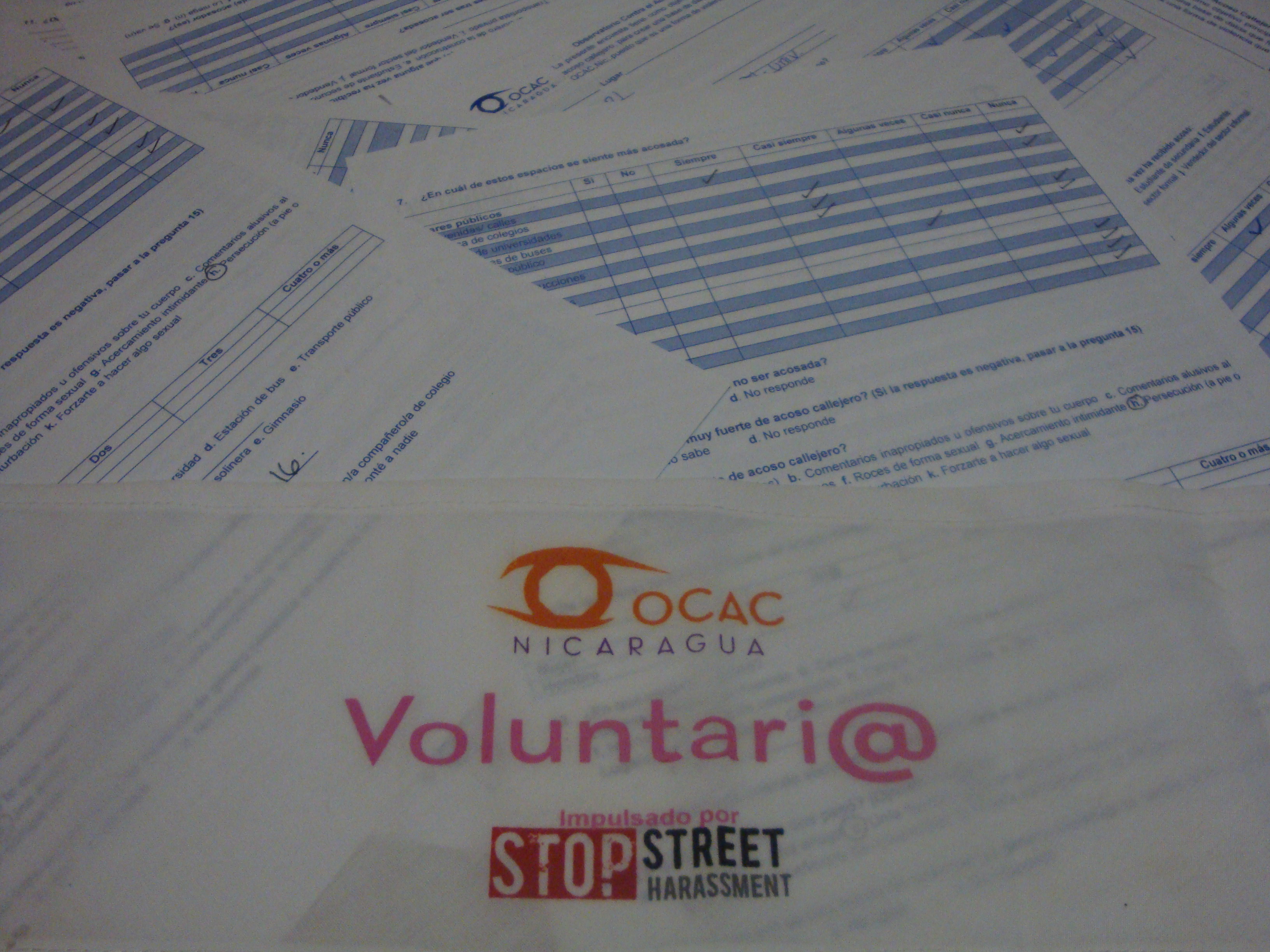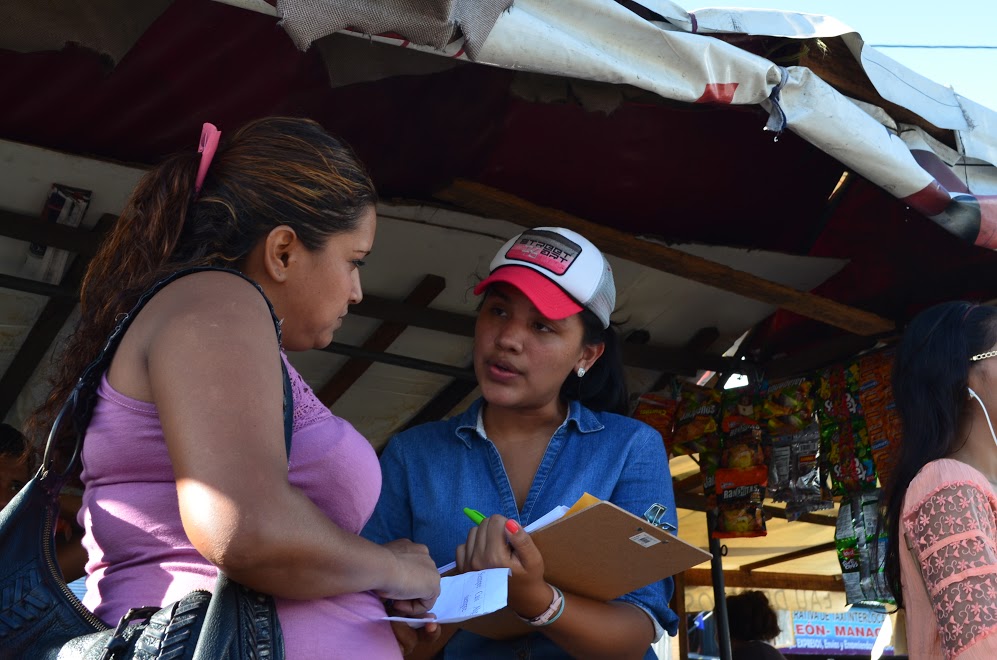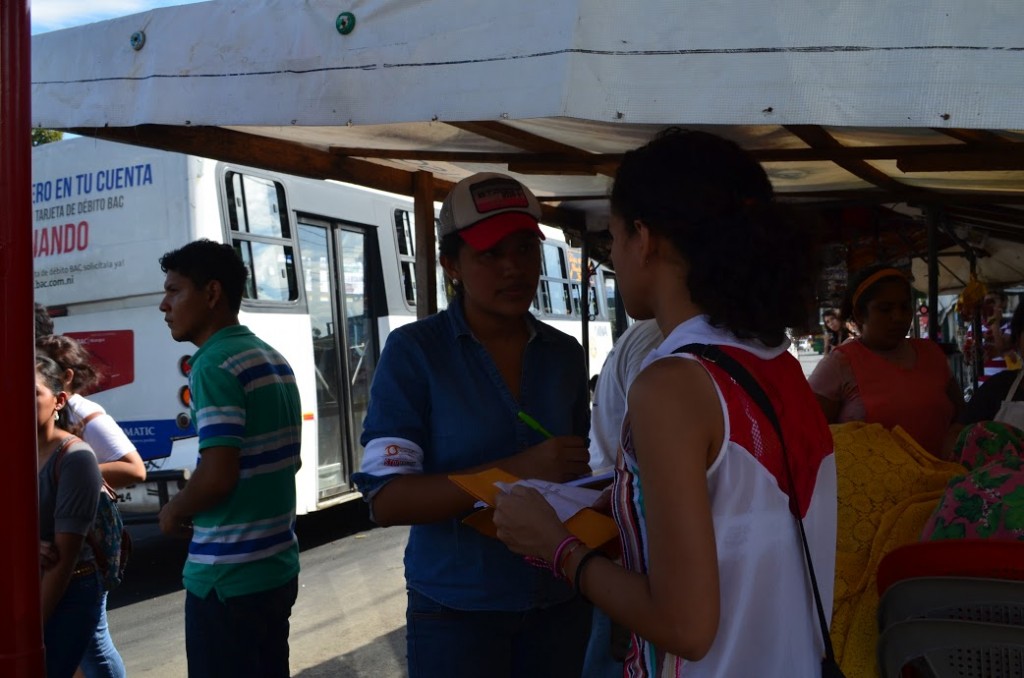Our six Safe Public Spaces Mentees are half-way through their projects. This week we are featuring their blog posts detailing how the projects are going so far. This fourth post is from our team in Nicaragua. Their projects are supported by SSH donors. If you would like to donate to support the 2015 mentees, we would greatly appreciate it!
 Desde hace poco más de tres meses, un grupo de universitarias nos unimos con la idea de hacer algo contra el acoso callejero en Nicaragua. Empezamos a buscar información, y encontramos un financiamiento que brindaba Stop Street Harassment para una iniciativa bastante concreta. Nos pareció que lo primero que necesitábamos era una encuesta que nos arrojara datos sobre cómo vivían las mujeres esta forma de violencia de género, y qué tan seguido les pasaba.
Desde hace poco más de tres meses, un grupo de universitarias nos unimos con la idea de hacer algo contra el acoso callejero en Nicaragua. Empezamos a buscar información, y encontramos un financiamiento que brindaba Stop Street Harassment para una iniciativa bastante concreta. Nos pareció que lo primero que necesitábamos era una encuesta que nos arrojara datos sobre cómo vivían las mujeres esta forma de violencia de género, y qué tan seguido les pasaba.
Así que empezamos, desde hace un mes (cuando obtuvimos el financiamiento de SSH), a aplicar una encuesta en las estaciones de buses a mujeres de 14 a 60 años. Las preguntas están enfocadas en descubrir los tipos de acoso callejero más frecuente, la especificación de una experiencia fuerte y la determinación de si el acoso callejero es o no violencia de género.
Y los resultados hasta el momento han sido sorprendentes. Un grupo fijo de ocho voluntarias hemos encuestado 5 días durante este último mes, y nos encontramos con que esta experiencia nos ha servido para recopilar información estadística, pero más aún para conocer de primera mano lo que piensa la gente, su forma de actuar ante el acoso callejero y las opiniones que antes no pensamos encontrarnos (ya que además de contestarnos la encuesta, muchas de ellas nos brindan mayor información sobre sus múltiples experiencias).
Muchas mujeres se mostraban dispuestas a contar sus historias, porque nunca antes habían sido escuchadas, pero muchas otras también se mostraron sumamente incómodas o avergonzadas cuando les preguntábamos qué experiencia fuerte habían tenido. También nuestras voluntarias se encontraron con opiniones como: “si contestás los hombres te van a pegar y te van a violar”, “no es violencia porque no me están pegando” u otras expresiones que demostraban la naturalización del problema.
Además, nos encontramos con un alto porcentaje de mujeres que calla. Muchas les expresaron a las voluntarias que no sabían cómo reaccionarían los hombres y que preferían ignorarlo.
 Y por supuesto, el número de mujeres que han tenido experiencias fuertes de acoso callejero es significativo, aunque debido a la naturalización, en ocasiones, a las mujeres les es difícil identificar que son o fueron víctimas de violencia. Algunas mujeres habían sido testigos de masturbación en público en autobuses, en caponeras, en taxis, en sus barrios y hasta afuera de su propia casa. Otro gran número de mujeres había sido víctima de exhibicionismo de genitales, la mayoría de ellas cuando eran pre o adolescentes. Una de las mujeres contó que mientras barría la acera de su casa, un ciclista le dejó ver su entrepierna. Ella sólo tenía 9 años. El caso más grave con el que nos encontramos hasta ahora fue el de una señora a quien un desconocido había intentado violar en la calle, cuando ella tenía 20 años.
Y por supuesto, el número de mujeres que han tenido experiencias fuertes de acoso callejero es significativo, aunque debido a la naturalización, en ocasiones, a las mujeres les es difícil identificar que son o fueron víctimas de violencia. Algunas mujeres habían sido testigos de masturbación en público en autobuses, en caponeras, en taxis, en sus barrios y hasta afuera de su propia casa. Otro gran número de mujeres había sido víctima de exhibicionismo de genitales, la mayoría de ellas cuando eran pre o adolescentes. Una de las mujeres contó que mientras barría la acera de su casa, un ciclista le dejó ver su entrepierna. Ella sólo tenía 9 años. El caso más grave con el que nos encontramos hasta ahora fue el de una señora a quien un desconocido había intentado violar en la calle, cuando ella tenía 20 años.
Aún nos falta mes y medio para terminar de llenar las encuestas, y nuestro compromiso contra el acoso callejero ha incrementado, ya que nos convencemos cada vez más de que visibilizar el problema es el primer paso para lograr que las mujeres dejen de verlo como algo común y que los hombres están en libertad de hacer. Hoy más que nunca, esperamos lograr una incidencia positiva a raíz de los resultados obtenidos con este pequeño estudio.
In English (using Google Translate)
Just over three months ago, a group of university students came together with the idea of doing something against street harassment in Nicaragua. We started looking for information and found Stop Street Harassment was providing financing for a fairly specific initiative. We found that the first thing needed was to conduct a survey to collect data about women’s experiences with this violence and how often it happens to them.
So we started a month ago (when we got the financing SSH) to implement a survey at bus stations to women ages 14 to 60 years. The questions are focused on discovering the most common types of street harassment, the specification of a powerful experience and the determination of whether or not street harassment is gender violence.
 And the results so far have been amazing. Eight volunteers have surveyed across five days during the past month, and we find that this experience has helped us to collect statistical information, but even more to learn first-hand what people think, how they react to street harassment and their opinions.
And the results so far have been amazing. Eight volunteers have surveyed across five days during the past month, and we find that this experience has helped us to collect statistical information, but even more to learn first-hand what people think, how they react to street harassment and their opinions.
Many women were reluctant to tell their stories at first because they had never shared them before, and many were also extremely uncomfortable or embarrassed when we asked about their toughest experiences of street harassment. Also our volunteers heard opinions like: “If you reply to their words, men will hit you and rape you,” or “It is not violence, no one is hitting me,” and other expressions showing the naturalization of the problem.
In addition, we found a high percentage of women who were silent when harassed. Many expressed their concern that they did not know how men would react and so preferred to ignore it.
And of course, the number of women who have had tough experiences of street harassment is significant, although due to the natrualization of it, sometimes women find it difficult to identify who are or were victims of violence. Some women had witnessed public masturbation in buses, in taxis, in their neighborhoods and even outside their home. Another large number of women had been victims of genital exhibitionism, mostly when they were pre or teenagers. One of the women said that while sweeping the sidewalk outside her home, a cyclist showed her his crotch. She was only 9 years old. The worst case we encountered so far was that of a woman who had experienced attempted rape by a stranger on the street when she was 20.
We still have a month and a half to finish filling out surveys, and our commitment against street harassment has increased and convinced us more that exposing the problem is the first step in getting women to stop seeing it as common and something that men are free to do. Today more than ever, we hope to achieve a positive impact due to the results obtained with this small study.
Noelia Gutiérrez is founder of Observatorio Contra el Acoso Callejero, Nicaragua.
